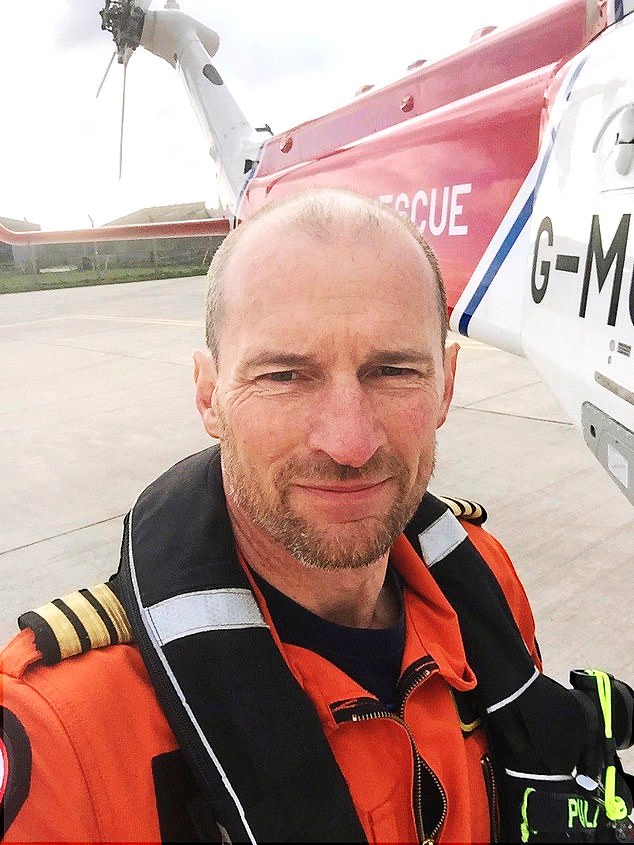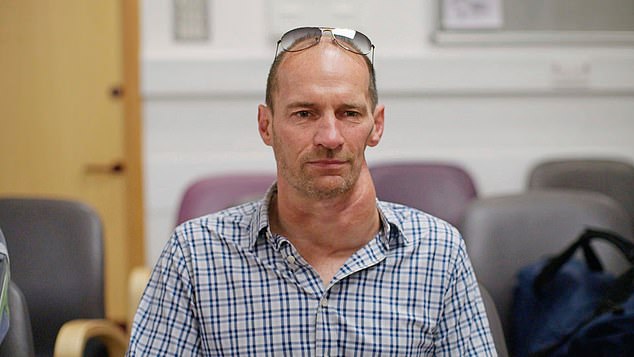A former Royal Navy pilot with a tumor stretching from his jaw to his heart is now cancer-free after a pioneering 12-hour procedure saved his life.
Rich Sutton, 53, was diagnosed 12 years ago with epithelioid fibrosarcoma, a rare and usually fatal cancer that starts in the bone but can spread anywhere, making it difficult to treat.
The father-of-two, who spent decades flying helicopters in Northern Ireland, Afghanistan and Iraq, is among hundreds of Armed Forces personnel who say their rare and deadly cancers have been caused by exposure to toxic exhaust gases during their years of service.
In his case it started in the neck and spread throughout the body. Despite eight rounds of surgery over ten years, Rich’s cancer continued to return: one tumor grew so large that it left him breathless as it crushed his windpipe.
Surgeons at three hospitals told Rich that the growth was inoperable due to its size and proximity to a major blood vessel that carries blood to his brain. He was given less than a year to live and prepared to say goodbye to his children Tom, 28, and Emma, 25.
Rich Sutton, 53, was diagnosed 12 years ago with epithelioid fibrosarcoma, a rare and usually fatal cancer that starts in the bone but can spread anywhere, making it difficult to treat.
But in a marathon operation last year, a team of surgeons managed to remove the tumor completely.
Rich, who lives in Cardiff, is now recovering at home and can breathe normally again.
His extraordinary story will be among those featured in Channel 4’s new series of Super Surgeons: A Chance At Life. The four-part documentary follows patients at London’s leading cancer hospital Royal Marsden as they undergo complex operations and often life-threatening.
“I’d been told three times that I’d reached the end of the road, so I went to London with a one percent expectation that anything could be done,” Rich says. “I just wanted to be able to look my children in the eyes and tell them, after 12 years, radiation therapy, chemotherapy and eight previous surgeries, that I had truly exhausted all options.”
Rich believes his cancer was caused by unknowingly inhaling aviation fuel exhaust while serving as a naval pilot.
“The Sea King plane that I used to fly burns aviation fuel, which produces all kinds of chemicals that would come in through the cargo door,” he explained. ‘(It) turned out to have been a problem that had been known about for some time.
“So the irony of me having my dream career is that it may be the cause of my cancer.”
In dozens of ongoing lawsuits, former RAF and Navy pilots – including Prince William’s former trainer Zach Stubbings – have accused the Ministry of Defense of failing to protect crews from carcinogenic emissions from military helicopters, some of which which are still in service. They have been diagnosed with cancers such as non-Hodgkin lymphoma, multiple myeloma, throat cancer, lung cancer and testicular cancer.
It was 2011 when Rich noticed a lump on the roof of his mouth, which was surgically removed. Although doctors told him it was a single benign tumor, four years later another egg-sized growth appeared at the base of his skull.

The father-of-two, who spent decades flying helicopters in Northern Ireland, Afghanistan and Iraq, is among hundreds of Armed Forces personnel who say their rare and deadly cancers have been caused by exposure to toxic exhaust gases during their years of service.
That same year, Rich was diagnosed with epithelioid fibrosarcoma. Operations over nine years removed the tumors as they appeared in his spine, lungs and throat.
But the cancer returned, and when he went to doctors with a suspected tumor in his neck in 2021, Rich was told that, this time, nothing could be done.
By the time Rich was referred to Professor Vin Paleri, consultant head and neck surgeon at The Royal Marsden, the tumor had caused the lining of his carotid artery, through which blood flows to the brain, to become paper thin. His windpipe had also been pushed to the other side of his neck, which meant he was having trouble breathing at all times.
But to Rich’s surprise, Dr. Paleri offered him one last chance to survive. “It was a very complex surgery,” said the surgeon.
Rich was warned that he could have trouble swallowing and voice problems, and could even be at risk of having a stroke or dying during the operation. To ensure that Rich continued to deliver blood to his brain during surgery, Dr. Paleri had to avoid the artery while he cut away the tumor surrounding it. The size of the tumor required his chest to be opened.
After a mammoth 12 hours in the operating room, the growth was completely removed.
But the procedure had taken its toll, and within hours, Rich suffered a stroke.
However, after nine months of rehabilitation, he is still cancer-free. He has returned to driving and hopes to soon get back on the motorcycle, one of his passions.
“Recovery has been a long, hard slog, but my family and friends have been amazing,” Rich says. “I hope my determination to survive has rewarded your love.”
Experts say Rich’s procedure could help patients with similar tumors.
“I have red lines that I can’t and don’t want to operate on,” says Dr. Paleri, “and with every complex surgery I perform, those red lines get pushed further and further.”
‘Performing this type of surgery gives us more confidence in addressing this type of tumors. I hope it also encourages patients to get another opinion about their medical care if their treatment center says there is nothing they can do.’
Other inspiring stories featured on Super Surgeons include Anthea, 18, an aspiring midwife with a tumor in her arm so difficult to remove that doctors say they may need to amputate it, and fitness fanatic Jonathan, 48, who He had no symptoms before being diagnosed with a rare melanoma and now needs surgery to remove a tumor between the esophagus and the heart.
An MoD spokesperson said: ‘We continually review our policies to ensure they are aligned with good practice and protect our people from harm.
“Military personnel and veterans who believe they have suffered health problems have the right to seek compensation under the Armed Forces Compensation Plan.”
Super Surgeons: A Chance at a Lifetime starts Tuesday at 9pm on Channel 4.

